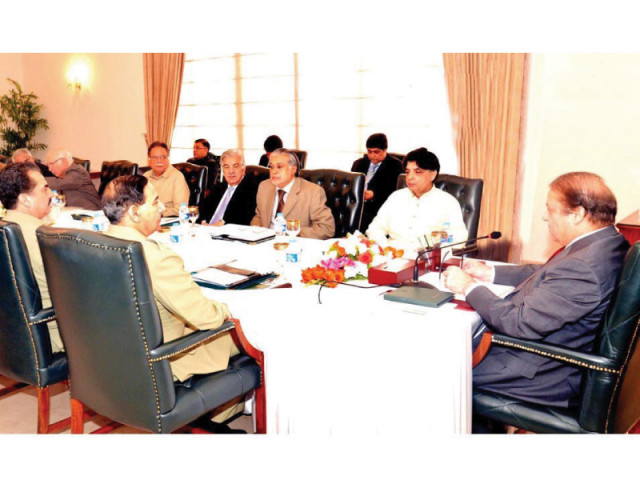Despite ceasefire setback: Govt stands firm on peace talks
Security forces will hit back if militants carry out attacks, says official privy to NSC meeting.

Prime Minister Nawaz Sharif chairs the National Security Committee meeting at the PM House. PHOTO: NNI
The government on Thursday resolved to continue talks with the Taliban but at the same time stated that talks without a ceasefire would not be possible – an apparent bid to push the group into reconsidering its decision to end the ceasefire.
While the government seemed steadfast on pursuing dialogue, security forces, however, were given the green signal to retaliate if the Tehreek-i-Taliban (TTP) carries out attacks in the country, according to officials privy to a high-level meeting of the National Security Committee (NSC) held in the capital.
The meeting chaired by Prime Minister Nawaz Sharif and attended by ministers of defence, finance, information and interior as well as three services chiefs and heads of Inter-Services Intelligence (ISI) and Intelligence Bureau (IB), was called soon after the TTP refused to extend the ceasefire over what it claimed is the government’s lack of positive response to its ‘peace overtures’.
A government official familiar with details emerging from the high-level huddle told The Express Tribune that while the civil and military leadership voiced concern over the TTP announcement, they remained resolute on the policy of peace talks.
“But this should not be seen as our weakness,” cautioned the official, who said security forces would hit back at militants if they resort to policy of violence.

An official statement issued after the meeting also indicated that the government would still push for an elusive peace deal with the TTP.
“The NSC endorsed the vision to put Pakistan on the crossroads of opportunity rather than conflict to spur growth for prosperity of the people,” said the statement.
Minister for Interior Chaudhry Nisar Ali Khan briefed the participants on the internal security situation as well as talks with TTP.
The NSC also discussed other issues related to internal and external security including situation in Balochistan and on the western border.
Nawaz said the committee is an apex forum where every state institution gets an opportunity to provide its input so that all national security related decisions are taken through collective thinking.
He also agreed that national security was of paramount importance for consolidating economic gains that the government had achieved through macroeconomic policies and diligence of the economic team.
Nisar is skeptical
Interior Minister Chaudhry Nisar Ali Khan on Thursday issued a statement expressing uncertainty about the peace process in the aftermath of the terminated ceasefire agreement.
After meeting with the TTP committee coordinator Maulana Samiul Haq, Nisar said it would perhaps not be possible for the government to carry forward purposeful dialogue.
“I do not think that purposeful dialogue can move forward in the absence of a ceasefire,” the statement read.
Haq was quoted as saying that he was still optimistic for the resolution of all issues through talks.
The interior minister convened a meeting of the Taliban committee on Saturday to devise the future plan of action in the backdrop of recent developments.
Responding to the assertion by the Taliban that the government is not serious about talks, Nisar said, “It would be inappropriate to say that the government was not serious in dialogue with the TTP.”
He said that the government had addressed all the issues hindering peace talks during the last few months with sincerity and patience.
Giving reference to the first round of face-to-face talks with the TTP shura in which the government committee had traveled to South Wazirstan, he said, “Had there been no seriousness on the part of the government, it would not have been to South Waziristan,”
While talking about the reservations expressed by the TTP, Nisar said, “If the Taliban have reservations over some issues, then we also have several but we carry forward the talks process with sincerity.”
“Reservations on both the sides can be addressed on the dialogue table and not through media statements,” he added.
On the other hand, negotiators have not given up yet.
“We are trying our level best and are contacting both sides for the resolution of issues which have emerged,” member of the Taliban committee Maulana Yousaf Shah said to The Express Tribune.
Shah was upbeat about convincing the Taliban for the ceasefire. “We are hopeful that they [Taliban] would agree.”
Talking about the Taliban’s decision, he said that “I would not term it a deadlock rather would say that they have expressed their reservations.”
Intermediary Professor Ibrahim on Thursday said the TTP have raised some complaints about the government.
Ibrahim told The Express Tribune that the TTP committee tried to convince the group’s top leadership to continue peace talks. “We will take up their complaints after taking stock of them and discuss with the government,” he said.
The JI leader said that they will contact the government regarding the TTP’s concerns which were highlighted by the media. He reiterated that they will meet the TTP leadership to persuade them to extend the ceasefire.
Published in The Express Tribune, April 18th, 2014.



















COMMENTS
Comments are moderated and generally will be posted if they are on-topic and not abusive.
For more information, please see our Comments FAQ